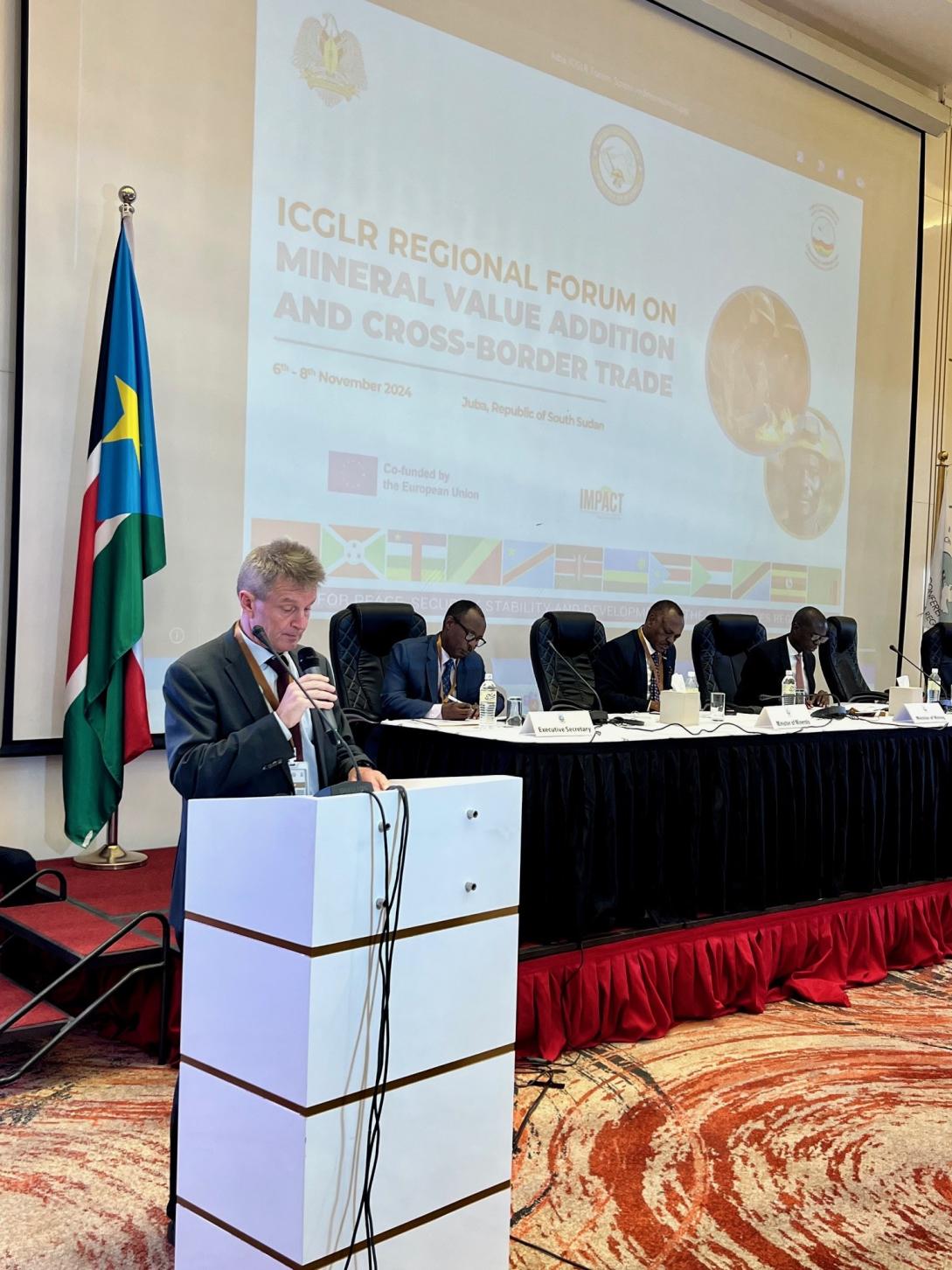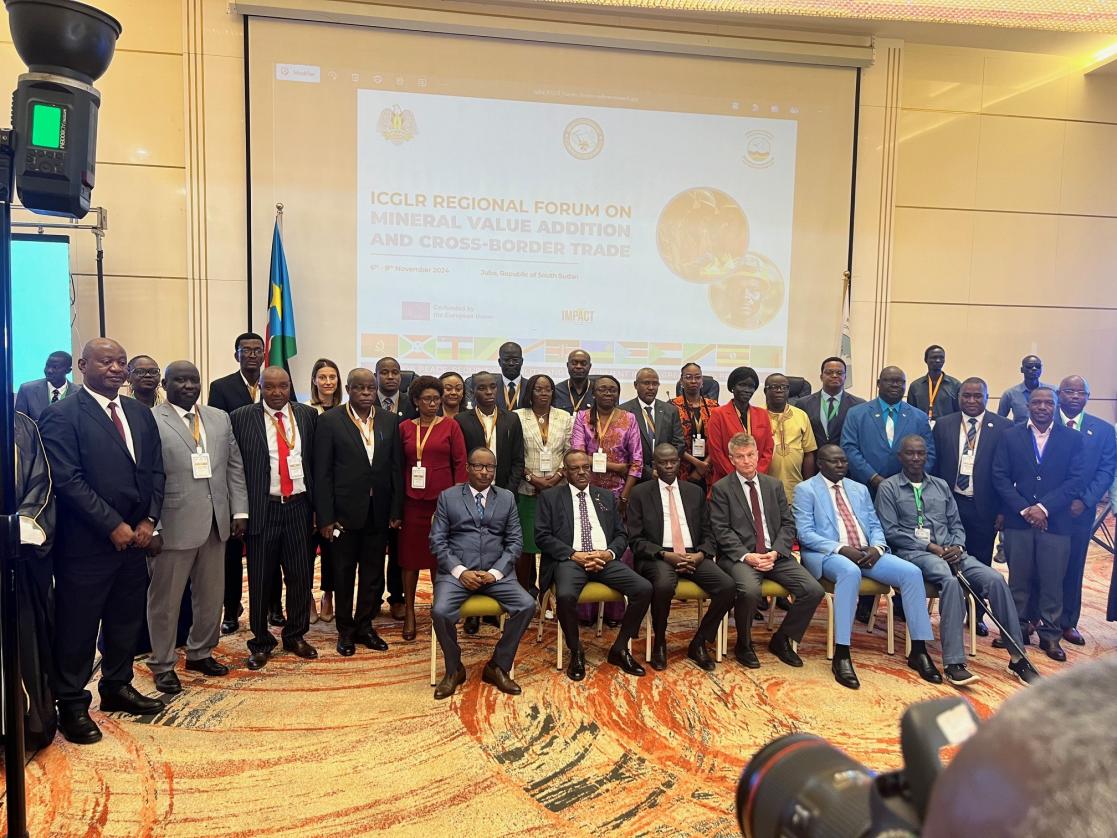Remarks by Ambassador Timo Olkkonen at the Regional ICGLR Forum

It is my honour and privilege to welcome you all to the International Conference on the Great Lakes Region (ICGLR) Regional Forum on Mineral Value Addition and Cross-Border Trade. I am also honoured since I am attending the forum in my capacity as Representative of the European Union which is together with the EU member states a staunch supporter of the ICGLR and also a financial supporter of this event.
I would therefore like, at the outset, to take this opportunity to extend my appreciation to the Government of South Sudan for hosting this Forum, which is of significant importance to economic ambitions the Great Lakes Region; I wish to thank the ICGLR Secretariat and our EU partner IMPACT for having coordinated all the arrangements of this Forum. I also wish to express my gratitude to all those who accepted to actively contribute to this Forum as moderators, presenters or discussants.
It is indeed a pleasure for me to be addressing this important assembly today that is meeting with the ambition to develop “a harmonised regional approach for the value addition and cross-border trade of minerals in view of maximising benefits of mineral resources and promoting peace and stability”.
As the European Union we firmly believe that a harmonised regional approach is crucial to seizing the potential of the Great Lakes Region’s rich endowment in mineral resources; but it is equally crucial to addressing the root causes of the insecurity and instability that the region is facing, including environmental damages, governance deficiencies, illegal exploitation of natural resources but especially devastating conflicts by armed groups. It is self-evident that the countries and the people are not reaping the benefits due to them from their minerals, which in many cases are smuggled and in some cases fuel conflict.
Today’s discussions are a crucial step in that very important process that started in 2008 under the leadership of the International Conference of the Great Lakes Region (ICGLR). In this regard, I would like to take this opportunity to commend the ICGLR for the valuable instruments put in place that have proven crucial for developing responsible mineral value and supply chains, but beyond that, lasting solutions for the region and its people.
The European Union is committed to engaging with regional interlocutors seeking to develop and implement a fair, open and rules-based trade and investment agenda. It stands ready to contribute to the development of intra-regional mechanisms for the management and sustainable governance of natural resource value chains, actively encouraging the passage from illegal trafficking of minerals to a legitimate market-based economy.
In this context, the EU supports the production, processing and trade of local sustainable minerals and the development of local and international value chains, including through mutually beneficial partnerships; governed by the principles of transparency the respect of due diligence standards and the respect of safe working conditions; and full adherence to regional certification mechanisms.
In the framework of our regional programme on peace and security in the Great Lakes region, we have joined forces with the ICGLR and our partner IMPACT to make tangible strives towards the improvement of mineral resources governance in the Great Lakes Region. And thus, I am pleased that this important regional forum is meeting today and tomorrow to deliberate on all aspects of the proposed Mineral Value Addition Guidelines.
I will not delve into the details of the eleven principles of the Mineral Value Addition Guidelines because you will have the opportunity to discuss them in
detail over the next two days, exchanging experiences, good practices and lessons learnt.
However, I would like to stress that regional cooperation and cross-border trade are essential for developing integrated mineral-based value-chain industries in the Great Lakes Region. By ending illegal artisanal mining, harmonizing policies, infrastructure, and trade practices, the countries of the Great Lake Region can create efficient and competitive mineral supply chains, boost regional economic growth, and add value to their raw minerals. Approaches firmly rooted in a sound legal and policy frameworks, as well as drawing on and supporting local human capital- while respecting human and labour rights-, are the only means to building the much-needed trust between populations, governments and the private sector. Only through strong partnerships that benefit all stakeholders one can leverage economies of scale, attract technology as well as investment, and ensure fair access to international markets.
I wish you constructive deliberations and I encourage you to work together towards common lasting solutions for the region and its people.

c
